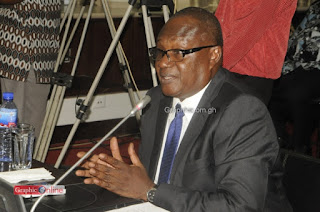Bani promises security for Parliament
By
Edmund Smith-Asante
 |
| Mr Prosper Bani |
The
Minister-designate of the Interior, Mr Prosper Douglas Kweku Bani, was Thursday taken
through 204 minutes of grilling, during which he pledged to engage with the
legislature on the provision of security for the members.
“I have
driven into this house or this compound several times. On no occasion has
anyone stopped my vehicle, checked my vehicle and asked me where I am going to.
I think that if given the opportunity to serve, one of the first actions I
would take is to work with leadership to secure Parliament House.”
He also
indicated that although the police size had increased to about 32,000, the
ideal police size should be 40,000. “We need to focus on prevention to ensure
that the risk to our citizens is reduced to the minimum. We need to work
together to ensure there is speed in resolving unresolved murders,” he
stressed.
As if to
say that security was of paramount interest to Ghanaians, members of the
Appointments Committee of Parliament took turns to question the President’s
nominee and the immediate past Chief of Staff, Mr Bani, on a wide range of
issues including the state of the country’s prisons, the handicap of the Ghana
National Fire Service and the murder of the Member of Parliament for Abuakwa
North, Mr Joseph Boakye Danquah-Adu, last Monday.
Other
issues raised during the vetting were the Fulani herdsmen menace, the use of
the VVIP lounge area of the Kotoka International Airport by Naa Ayerley to
smuggle out 12.5kg worth of narcotics, ethnocentric comments on the airwaves
and how they could endanger the peace, the acceptance of ex-detainees from
Guantanamo, the proliferation of small arms and the activities of a Muslim
cleric in Ghana who had been banned by some countries among many other issues.
Narcotics,
Guantanamo
In his
response to the issue of narcotics, Mr Bani declined to comment and said the
issue had gone through the judicial process and the necessary steps had been
taken to tighten security at the VVIP where it was alleged Naa Ayerley passed.
He also
stated that investigations were still ongoing and added, however, that the
fight against narcotic drugs needed to be heightened.
Answering
a question on the acceptance of the ex-Guantanamo detainees by the Ghana
government, the Interior Minister designate said they were not a security
threat to Ghanaians and added that the risk involved might be reduced to very
low levels.
He,
however, assured that he would seek to work with the IGP and his deputies on
the issue when given the nod
Small
arms
Touching
on the proliferation of small arms which could compromise the election this
year, Mr Bani said although it was scary that there were about 2.3 million
illicit weapons in people’s hands, there were consistent efforts by the
security services to reduce small arms and generally control them.
He stated
that one of the ways to deal with the issue was to tighten up security at
borders, using the resources that had been provided for marking of security weapons
and the ones owned by individuals.
He said he would work with stakeholders on
locally produced weapons which were also a worry, so that the threat to
citizens would reduce.
On the
strategies he would adopt to stem the tide on political vigilantism, Mr Bani
said the police were working on it and were in consultations with political
parties. “My sense is that we must respect the law. If they are security groups
then they must register and pay taxes,” he said.
He also
said he would ensure that the Ghana Fire Service was adequately resourced with
hydraulic platforms so that they would be able to deal with fires in high-rise
buildings in the country.
Eastern
Regional Minister designate
When she
took her turn, the Eastern Regional Minister designate, Ms Mavis Ama Frimpong,
answered questions on illegal mining, the prevalence of HIV and AIDS and
tourism in the region.
She said
the major challenge in the region was illegal mining referred to as ‘galamsey’.
“The law
on mining has some loopholes - operators arrested during swoops and those
behind are let off the hook. Arrested culprits are fined just GH¢200 and
released and their equipment released to them,” she lamented.
She told
the committee that the AIDS prevalence in the region had reduced from 7.9 per
cent in 2006 to 3.7 per cent in 2014, which meant that the region was no longer
in an epidemic stage.
This story was first published by the Daily Graphic
on February 12, 2016



Comments
Post a Comment